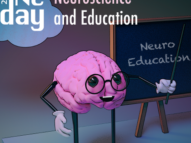events, seminars
March 22nd, 2024 – Elisabeth Traiffort (Maladies et Hormones du Système Nerveux, Université Paris-Saclay)- Androgens show sex-dependent differences in myelin regeneration of the central nervous system
Multiple sclerosis is an auto-immune, demyelinating and neurodegenerative pathology of the central nervous system (CNS). The early phase of the disease mostly corresponds to a relapsing-remitting form with a succession of demyelinating events, each followed by spontaneous myelin regeneration. Over… Continue reading
events, seminars
February 9th, 2024 – Stéphanie Baulac (ICM, Paris) – Brain mosaicism in epileptogenic cortical malformations
Focal Cortical Dysplasia (FCD) is the most common focal cortical malformation leading to childhood focal epilepsy that undergo epilepsy surgery. In recent years, we and others have shown that FCD type II is caused by mosaic mutations in genes within the PI3K-AKT-mTOR-signaling pathway. Hyperactivation… Continue reading
events, seminars
January 19th, 2024 – Nicolas Renier (Laboratoire de Plasticité structurale, ICM, Paris) – The developing post-natal cerebral vasculature
The brain is densely perfused by the vascular network, which provides nutrients and oxygen to support neuronal function. The architecture of the cerebral vasculature addresses specific constrains of the neural tissues, including the near absence of energy storage and very… Continue reading
events, seminars
January 12th, 2024 – Tatiana Novikova (Physique des Interfaces et Couches minces, Ecole polytechnique – Palaiseau) – Imaging Müller polarimetry for probing biological tissue at macro- and microscale
It has been proven that polarized light is extremely sensitive to tissue microstructure. Early pathological changes in tissues may not be visible with a naked eye. This contrast, however, can be increased in polarized light images, because these changes alter… Continue reading
events, seminars
November 10th, 2023 – Laurent Cohen (Département de Neurologie, Hôpital de la Salpêtrière and ICM – Paris) – The reading brain upside down and inside out
The ventral occipitotemporal (VOT) cortex plays a pivotal role in the visual recognition of various types of items, including objects, faces, places, and written words. The role of the left VOT in reading has been recognized since the 19th century… Continue reading
events, INC Meetings
October 19th, 2023 – INC Day 2023 – Neuroscience and Education
This year, the INC Day, organized in partnership with the masters programs BioMedical Engineering – Paris and NeuroParis and the Graduate school Psychological science, is dedicated to the impact of Neuroscience in Education. What are the neuronal bases of learning?… Continue reading
events, seminars
November 3rd, 2023 – Jean-François Brunet (IBENS – ENS)- Genetic architecture of the autonomic nervous system
A general structure for the autonomic nervous system, divided into sympathetic and parasympathetic arms, was codified by John Newport Langley at the beginning of the XXth century. We propose a revision of this scheme based on neuron types. The “sacral… Continue reading
events, seminars
October 6th, 2023 – Sarah Genon (Research Center Jülich, Germany) – From the complexity of brain organization to challenges in brain-behaviour mapping
Understanding brain-behaviour relationships in humans remains as one of the most complex scientific question. For a few decades, data offered by neuroimaging approaches, in particular MRI, have been under intense scientific investigations and methodological questioning. These have highlighted continuous challenges… Continue reading
events, seminars
September 29th 2023 – Eric Burguière (ICM, Paris) – Translational approach to investigate the neurofunctional bases of repetitive behaviours
Repetitive behaviors are acquired through practice and, under normal conditions, allow motor or cognitive processes to be efficiently automated in everyday life. However, a loss of control in the regulation of these processes can lead to their pathological overexpression. These… Continue reading
events, seminars
September 22nd, 2023 – Valérie Doyère (Paris-Saclay Institute of Neuroscience / NeuroPsi)- The amygdala and the temporal expectancy of a reinforcer
When a sound predicts the potential arrival of a reinforcer, the subject learns the time at which that reinforcer may arrive or is available. The amygdala, and in particular its basolateral (BLA) part is critical for the emotional/motivational aspect of… Continue reading


